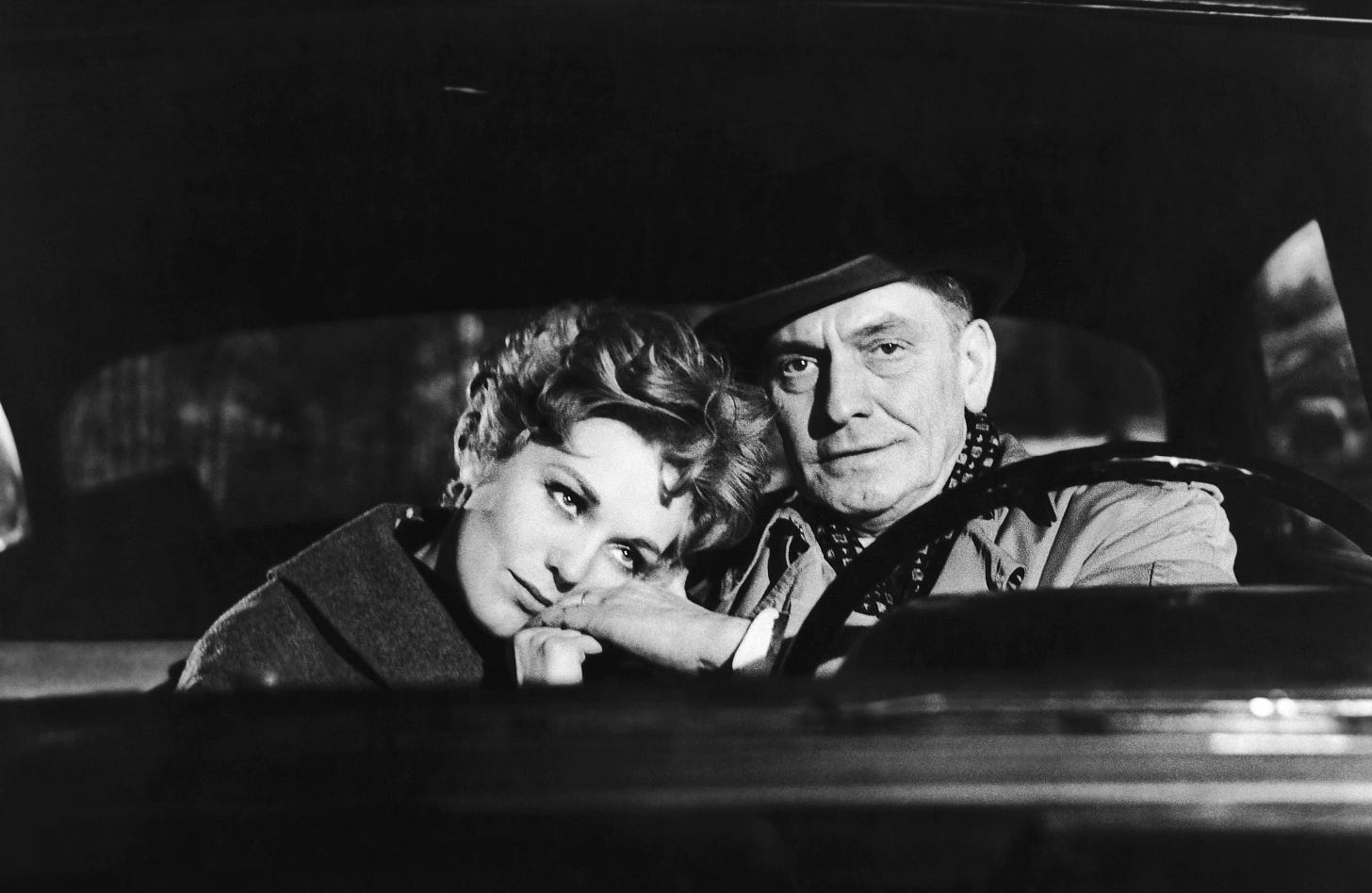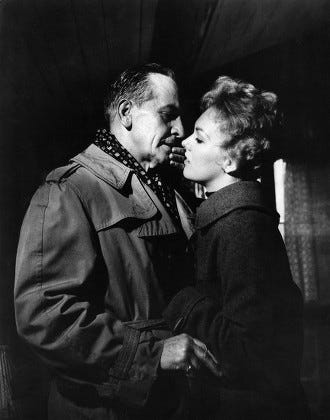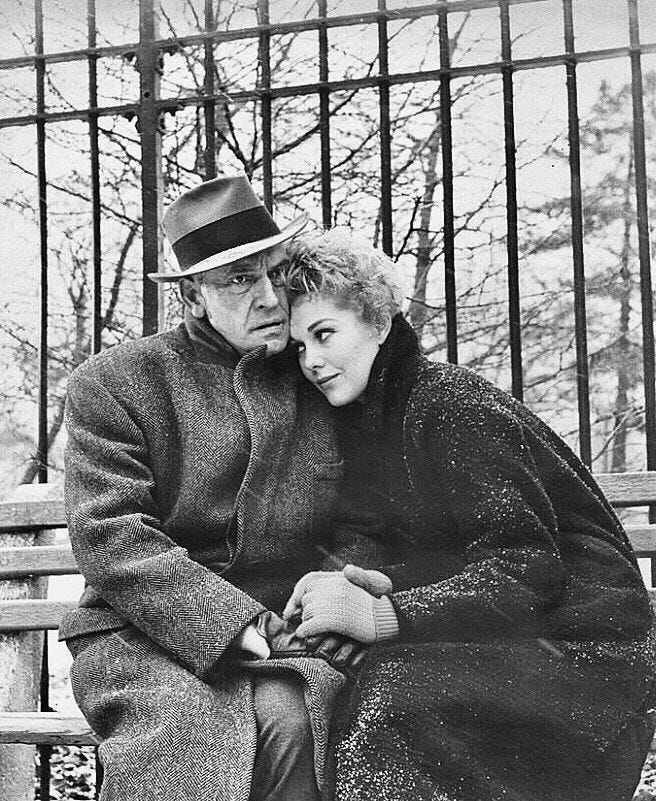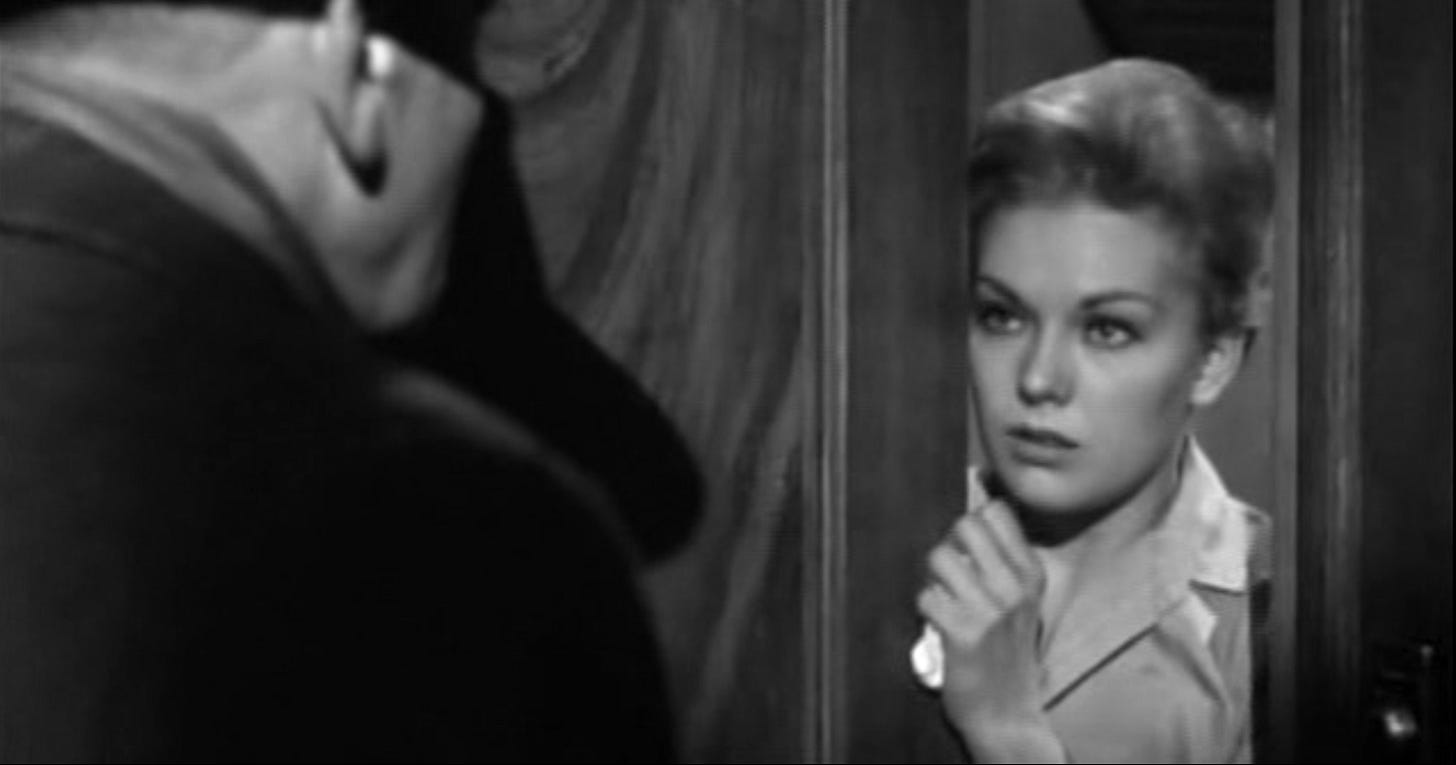Such a Sweet and Wonderful Torture
In honor of love and the back-to-back holidays of Kim Novak's birthday and Valentine's Day. Edited from an original piece published at the beautiful experiment that was the Classic Film Collective.
Widower Jerry Kingsley (Fredric March) walks into his $240-a-month high-rise apartment cold and soaking wet, with a spirit that is thoroughly crushed. Jerry’s overbearing older sister, Evelyn (Edith Meiser), who lives with him and acts more like a housekeeper and controlling, obnoxious gossip than a supportive sibling, is hard at work vacuuming the carpet. After scolding her brother for tracking dirt all over the freshly cleaned floor, Evelyn finally hears what she’s been patiently waiting and hoping for: Jerry’s relationship and engagement with Betty (Kim Novak), a woman half his age, is over. Devastated, Jerry barely holds his emotions together in front of his sister. He knows better than to give her a front row seat to his vulnerability and despair, but his resolve is crumbling. Predictably, Evelyn takes a little too much joy in the news, falling just short of saying, “I told you so.” She brushes off his heartbreak too quickly, because in her opinion, there’s no way he could have been that serious about this girl. She believes her brother doesn’t need a woman, and certainly not that woman. Fighting back tears, Jerry finally breaks.
Evelyn: You’ve got a good life for yourself, a fine business. You’ve got hundreds of friends.
Jerry: I feel something inside me is dying right now. I want to be loved by a woman. That want dies hard.
Just a glimmer of humanity and understanding from his sister is what Jerry desperately needs in this moment, but Evelyn doesn’t understand, nor does she want to. Realizing that Evelyn is unwilling to offer her support, Jerry demands solitude to grieve a loss that is perhaps greater than that of his late wife. There’s certainly more at stake here, as Jerry faces the prospect of spending his final years completely alone.
Director Delbert Mann routinely explored the everyday lives, troubles, and relationships of ordinary people. He was an efficient, no-frills director who brought his experience in television over to the big screen. Mann firmly believed in the importance of the story and script in his approach to directing, with strong acting talent capable of interpreting the story. If the story and acting were good, then everything else would fall into place. This sort of utilitarian approach to filmmaking translated to a more realistic look on the screen, beautifully demonstrated in his overlooked masterpiece Middle of the Night (1959)— one of the finest films of the 1950s and a bright spot in the careers of both Fredric March and Kim Novak. In a recent interview with author and historian Eddie Muller, Novak spoke about her experience making the film:
I will tell you one of the movies I really loved. I loved doing it. I loved everything about it and I look forward to watching it when it’s played again on Turner Classic Movies, and that is Middle of the Night. Wow, I loved it for so many reasons. It was special to me from a working point of view. I got to rehearse it. Most movies, you don’t always have a chance to do that or you’re rehearsing sometime a scene that appears at the end rather than the beginning when you start to work on it. So, you don’t get the consistency, but in Middle of the Night, which is a movie that actually Harry Cohn didn’t want me to do ‘cause he didn’t think it was glamorous and he wanted me mostly in glamorous movies. But for me, I loved the character and I loved the process of the way we worked on that movie and I loved everybody in it.
Through Mann’s direction and an incredible script by Paddy Chayefsky adapted from his original 1957 stage play, we witness the extraordinary circumstances surrounding a May-December romance between a widower in his late 50s and a 24-year-old divorcée. At first glance, one might assume their relationship is about sex and money, and nothing more. Just a typical fling between a dirty old man and a fortune hunter. But the relationship between Jerry and Betty isn't like that at all. It’s complex, beautiful, confusing, fulfilling, and even terrifying. And it has the makings of a long romance centered on mutual adoration and companionship.
In the two years since the death of his wife, Jerry’s shown no interest in pursing any sort of romance. Instead, he stays busy with his work as a successful garment manufacturer with a booming business that he founded with his friend Walter Lockman (Albert Dekker). Betty is newly divorced from her husband, George (Lee Phillips), a good-for-nothing musician with a wandering eye. Betty works for Jerry as a receptionist and secretary. She’s quite pretty and is constantly sexually harassed by many of the male employees and vendors. But Jerry never harasses her. Matter of fact, he’s so busy in his work that he hardly noticed her. At least, not like that. And so, when Betty has sent herself home to nurse a broken heart over her ex and the direction her love life has taken, she finds an unlikely confidant in her boss, who stops by her apartment to pick up some important papers. As Betty talks through her troubles, Jerry sees Betty for the first time. Yes, he’s struck by her beauty and poise, but he’s attracted to her spirit and her need and desire to be loved. And for the first time in years, even before his wife’s death, Jerry seizes an opportunity for real happiness. A chance to live life. Jerry and Betty start seeing each other, fueled purely on their mutual emotion and desire.
But for Betty, the reality of the situation quickly sets in. Although she loves Jerry’s company, and she cares for him deeply, but she can’t allow herself to give in. Yes, she’s worried about flouting social conventions with their age difference, but she’s terrified of her perceived inability to love another person unconditionally, an insecurity planted and nurtured by her emotionally abusive ex-husband. As a result of that abuse, Betty has a fairly immature view of love, preferring to keep her romantic relationships to meaningless flings. Betty even goes so far as suggesting that Jerry is too nice for her and things would be better for him if he was just interested in sex. But Jerry doesn’t just want sex, he wants a partner. He wants someone to spend the rest of his days with. And he doesn’t care what other people think, including his family. He sees a possible future with Betty, and he knows that she needs it, too, and he fights like hell to hold onto it.
With this unconventional love comes great uncertainty and stress for Jerry and Betty. As their relationship progresses, Jerry grows paranoid, terrified that Betty will leave him for a younger man. Each day is beautiful for Jerry, as he’s reminded that he doesn’t have to spend it alone, but he goes through fits of jealousy and moodiness, which unintentionally drives a wedge between them. But the strain also helps their relationship by bringing much-needed closure to other aspects of their lives, specifically regarding Betty’s relationship with her ex-husband. That closure makes Betty realize how much she loves and needs Jerry and is finally ready to commit to a life with him. But old habits die hard, and Jerry has difficulty adapting to a more modern relationship and Betty’s interpretation of love. He views her path to accepting herself and the need for his love as a betrayal. It’s over.
With Evelyn gone, Jerry finally weeps for what was lost with Betty. The loneliness overwhelms him. It might even kill him. But just as he’s falling deeper into his despair, Jerry is hit with the reality of his mortality and the fleeting nature of life: his friend and business partner Walter has attempted suicide after a romantic tryst with one of his “tootsies.” Standing in the hotel room with Walter’s son Joey, surrounded by the carnage of Walter’s misery, Jerry has an epiphany.
Joey: Why would he go and try to kill himself?
Jerry: Listen, Joey, your father hasn’t been alive for twenty-five years, so how can you say he tried to kill himself?
Joey: Look at what he’s doing to my mother. Runs around with those cheap floozies. A dirty old man. He could be taking it easy now at his age. He could…he could be living a life of peace—
Jerry: Who the hell wants peace! You can have all the peace you want after you’re dead. Your father wanted life, he wanted love. Even if he had to pay money for it. What the hell’s wrong with everybody? All they want is peace, comfort, security, no problems. Well, life is problems. Heartache. Passion. A woman. Listen, sonny boy. Love, no matter how shabby it may seem, is still a beautiful thing. And everything else is nothing. You take care of your mother.
Joey: I wish you’d stick around a little longer, Mr. Kingsley.
Jerry: I’m sick of death, Joey. I’m running around with a young woman myself. The last couple of months have been torture for me. Such a sweet and wonderful torture. I was living, Joey. There was never enough hours in the day for me. Had such a passion for everything. I was living.










